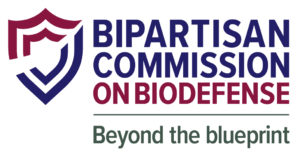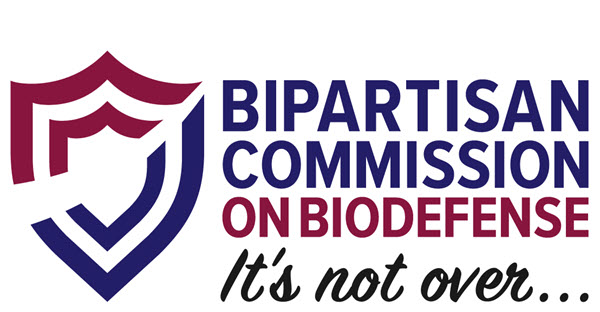Biodefense Commission To Meet This Week To Advance Plans For The Next Apollo Program, Aimed At Eliminating Pandemic Threat In Ten Years

FOR IMMEDIATE RELEASE
Contact: Steve Aaron
SRA Communications
(717) 554-8614
steve@SRACommunications.com
BIODEFENSE COMMISSION TO MEET THIS WEEK TO ADVANCE PLANS FOR THE NEXT APOLLO PROGRAM,
AIMED AT ELIMINATING PANDEMIC THREAT IN TEN YEARS
New Omicron Variant of COVID-19 Reminds Us That Biological Threats Persist and Underscores the Need for an Apollo Program for Biodefense
WASHINGTON, D.C. (Dec. 6, 2021) – The Bipartisan Commission on Biodefense will host its next in-person meeting this Wednesday, Dec. 8, to provide a better understanding of ongoing public and private sector contributions to a grand project similar in scope and importance to the mission to put humans on the Moon. Titled, The Athena Agenda: Executing The Apollo Program for Biodefense, the meeting will feature Sen. Richard Burr (R-NC) Ranking Member of the Senate Health, Education, Labor and Pensions Committee; Dr. Eric Lander, Science Advisor to President Biden and Director of the Office of Science and Technology Policy; Dr. Stephen Hahn, Chief Medical Officer at Flagship Pioneering and former Commissioner of the Food and Drug Administration; and Dr. Tara O’Toole, former Under Secretary for Science and Technology at the Department of Homeland Security, among others.
“The recent discovery of the Omicron variant of COVID-19 is yet another reminder of why our federal government must get much more aggressive in how our nation deals with biological threats,” said Commission Co-Chair, former Senator Joe Lieberman. “If the U.S. government acts now to implement our proposed Apollo Program for Biodefense, we could effectively end the era of pandemic threats and eliminate U.S. vulnerabilities to biological attacks in the next decade. This upcoming meeting will help us to better understand what progress has been made since we first introduced the idea of such an Apollo Program nearly a year ago and what work needs to be done to advance it by the Administration and in Congress.”
The Bipartisan Commission on Biodefense first identified the need for a Manhattan Project for biodefense in 2019 and called on the federal government to urgently implement the recommendations specified in its report, The Apollo Program for Biodefense: Winning the Race Against Biological Threats, in January 2021. The report detailed an ambitious program to develop and deploy the science and technologies needed to defend against all biological threats, empower public health, and prevent pandemics. The Commission argues if the United States acts now, this Apollo Program could effectively end the era of pandemic threats in ten years.
With ambitious technology goals in mind, the Commission’s recommended grand Program would ideally deploy medical countermeasures within days, or in advance, of a biological event, detect a novel biological threat at the first human or animal cluster, and enable the public to gather in spaces built to defend against pathogen transmission. The United States must invest in innovation, achieve goals quickly, and engage and motivate America’s entrepreneurial spirit.
“The COVID-19 pandemic has killed millions around the world, ravaged health systems and devastated economies,” said Commission Co-Chair and first U.S. Secretary of Homeland Security Tom Ridge. “It also has exposed destabilizing divisions within and among countries and revealed domestic and global weaknesses in biodefense. We must do everything in our power to put an end to the harm caused by COVID-19 and make sure something like it never happens again. We are certainly not there yet.
“Catastrophic infectious disease outbreaks occur regularly throughout history and experts agree that they will occur with greater frequency because of modern travel and international commerce. We spend billions preparing for other threats to American lives (such as war), but too little to prevent infectious diseases, which tragically kill more people. Spending on biological risk reduction would be far less than the significant cost of continuing to let this and future pandemics harm our people and weaken our nation again.”
The meeting will begin at 10:00 am ET at Hudson Institute, 1201 Pennsylvania Avenue NW, Suite 400, Washington, DC. The Commission will also live-stream the meeting. To register, and for a full list of participants, please visit the events page on the Commission website, www.biodefensecommission.org/events/.
Editor’s Note: Journalists interested in interviews should contact Steve Aaron by emailing steve@SRACommunications.com.
About the Bipartisan Commission on Biodefense
The Bipartisan Commission on Biodefense was established in 2014 to conduct a comprehensive assessment of the state of U.S. biodefense efforts, and to issue recommendations to foster change. The Commission’s 2015 report, A National Blueprint for Biodefense: Leadership and Major Reform Needed to Optimize Efforts, identified capability gaps and recommended changes to U.S. policy and law to strengthen national biodefense while optimizing resource investments. In its 2021 report, Biodefense in Crisis: Immediate Action Needed to Address National Vulnerabilities, the Commission described the extent to which the federal government has implemented the Commission’s recommendations. Other Commission publications have addressed critical needs for an Apollo Program for Biodefense; national biodetection; biodefense of critical infrastructure; diagnostics; State, Local, Tribal and Territorial response capabilities; agrodefense; and biodefense budgeting. In September 2018, the White House released the National Biodefense Strategy, a top recommendation from the Blueprint. The Commission continues to address biodefense challenges and urge reform. Former Senator Joe Lieberman and Governor Tom Ridge co-chair the Commission. Hudson Institute is the Commission’s fiscal sponsor.

